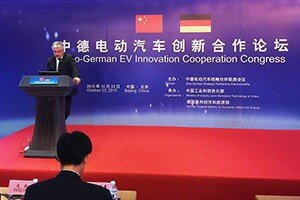 The German Federal Ministry for Economic Affairs and Energy (BMWi) and the Chinese Ministry of Industry and Information Technology (MIIT) jointly hosted the Sino-German Innovation Congress on Electro-Mobility, with support of China Automotive Technology and Research Centre (CATARC) and Deutsche Gesellschaft für Internationale Zusammenarbeit (giz) GmbH, on 23rd October 2015 in the Chinese National Convention Center, Beijing.
The German Federal Ministry for Economic Affairs and Energy (BMWi) and the Chinese Ministry of Industry and Information Technology (MIIT) jointly hosted the Sino-German Innovation Congress on Electro-Mobility, with support of China Automotive Technology and Research Centre (CATARC) and Deutsche Gesellschaft für Internationale Zusammenarbeit (giz) GmbH, on 23rd October 2015 in the Chinese National Convention Center, Beijing.
The conference was split into five main sections with different foci:
- Market Development of electro-mobility
- Standards and Regulations of electro-mobility
- Charging Infrastructure
- Research and Development on Advanced Technologies
- Demonstration and Promotion
Dr. Wolfgang Scheremet (Director General of BMWi) and Mr. Qu Guochun (Deputy Director General of MIIT) opened the conference with keynote speeches. After this introduction the congress started with its sessions on the annual key topics in electro-mobility.
In the first section representatives of the China Association of Automobile Manufacturers (CAAM) and the German National Platform Electric Mobility (NPE) held presentations of the electric-mobility development strategies in both countries.
The harmonisation of the Chinese and German standardisation roadmaps of electro-mobility is very important for the cooperation of both countries and therefore has been also a major issue in this conference, where representatives of CATARC and the German Institute for Standardization (DIN) presented the current status as well as the future standardization activities in the field of electro-mobility.
Another essential condition for the successful operation of electric-vehicles in both countries is the construction and operation of an extensive and interoperable charging network. The Sino-German EV Charging Project (SGEVCP) implemented by GIZ, CATARC and German and Chinese automakers aims to assess the business and policy framework conditions for building up and operating electric vehicles’ charging infrastructure and develop recommendations in order to improve the availability of charging solutions for electric vehicle users. At this congress, representatives of CATARC and GIZ jointly presented the results of the case study on private charging infrastructure as well as the future approach of the project to examine the development of public and semi-public charging infrastructure.
The focus of the following section was on research and development in the electro-mobility sector. Chinese Tongji University and German Technical University of Munich presented current research and study programs and announced to intensify their cooperation to improve the development of advanced technologies.
In the last section, which was about demonstration and promotion of electric vehicles, German and Chinese companies presented new approaches in terms of charging models or crowd funding possibilities. One example is the German company Ubitricity that provides a new concept for charging infrastructure with an intelligent charging cable which can meter the charging process and handle the billing. This enables the use of usual sockets and could significantly reduce the price for the installation of charging infrastructure. Other interesting projects are for example the eHighway, a demonstration project about electronic trucks from Siemens, and the innovative model of crowd funding for public charging infrastructure by Jiangsu Wanbang Charging Facility Co., Ltd..
The Sino-German Electric-Vehicle Innovation Cooperation Congress brought experts from politics, industry, associations and academia together and facilitated an intensive exchange and cooperation between the two countries in the field of e-mobility.
Within this scope the project “Advisory and Support of Sino-German Cooperation on Electro-Mobility” implemented by GIZ on behalf of Federal Ministry for Economic Affairs and Energy (BMWi) supported the whole congress. The aim of the project is to facilitate the dialogue between BMWi and MIIT and other stakeholders of both countries as well as to provide expert advice in the fields of market development, standardisation and development of charging infrastructure.
Contact:


